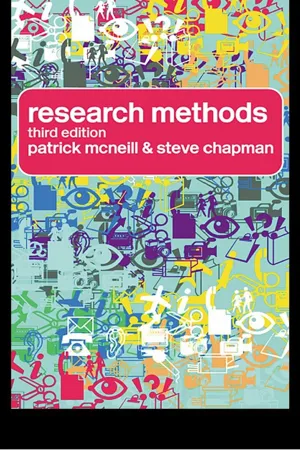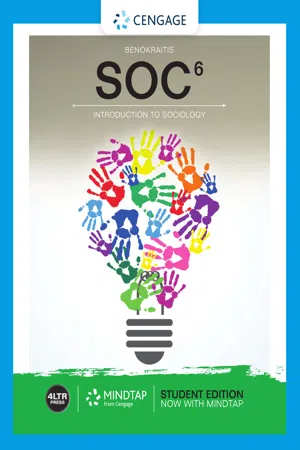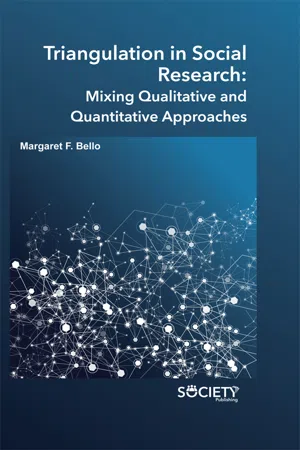Social Sciences
Research Methods in Sociology
Research methods in sociology refer to the systematic approaches used to investigate social phenomena and collect data for sociological studies. These methods include qualitative and quantitative techniques such as surveys, interviews, observations, and experiments. Researchers in sociology use these methods to gather and analyze information about human behavior, social structures, and cultural practices within society.
Written by Perlego with AI-assistance
Related key terms
1 of 5
12 Key excerpts on "Research Methods in Sociology"
- eBook - PDF
Sociology
The Essentials
- Margaret Andersen, Margaret Andersen, Howard Taylor(Authors)
- 2019(Publication Date)
- Cengage Learning EMEA(Publisher)
There are other kinds of sociological research that sociologists do. Some approaches are more structured and focused than participant observation, such as survey research. Other methods may involve the use of official records or interviews. The different approaches used reflect the different questions asked in the first place. Some methods may require statistical analysis of a large set of quantitative information. Either way, the chosen research method must be appropriate to the sociological question being asked. (In the “Doing Sociological Research” boxes throughout this book, we explore different research projects that sociologists have done, showing what question they started with, how they did their research, and what they found.) However it is done, research is an engaging and demanding process. It requires skill, careful observa- tion, and the ability to think logically about the things that spark your sociological curiosity. Sociology and the Scientific Method Sociological research derives from what is called the scientific method, originally defined and elaborated by the British philosopher Sir Francis Bacon (1561–1626). The scientific method involves several steps in a research process, including observation, hypothesis testing, analysis of data, and drawing conclu- sions. Since its beginnings, sociology has attempted to adhere to the scientific method. To the degree that it has succeeded, sociology is a science. Yet, there is also an art to developing sociological knowl- edge. Sociology aspires to be both scientific and humanistic, but sociological research varies in how strictly it adheres to the scientific method. Some sociologists test hypotheses (discussed later); others use more open-ended methods, such as interviewing with open-ended questions and the examples of participant observation above. CHAPTER 3 Doing Sociological Research 61 Copyright 2020 Cengage Learning. All Rights Reserved. May not be copied, scanned, or duplicated, in whole or in part. - eBook - PDF
- Tonja R. Conerly, San Jacinto College, Kathleen Holmes, Northern Essex Community College, Asha Lal Tamang, North Hennepin Community College(Authors)
- 2021(Publication Date)
- Openstax(Publisher)
The following sections describe these approaches to knowledge. The Scientific Method Sociologists make use of tried and true methods of research, such as experiments, surveys, and field research. But humans and their social interactions are so diverse that these interactions can seem impossible to chart or explain. It might seem that science is about discoveries and chemical reactions or about proving ideas right or wrong rather than about exploring the nuances of human behavior. However, this is exactly why scientific models work for studying human behavior. A scientific process of research establishes parameters that help make sure results are objective and accurate. Scientific methods provide limitations and boundaries that focus a study and organize its results. The scientific method involves developing and testing theories about the social world based on empirical evidence. It is defined by its commitment to systematic observation of the empirical world and strives to be objective, critical, skeptical, and logical. It involves a series of six prescribed steps that have been established over centuries of scientific scholarship. 36 2 • Sociological Research Access for free at openstax.org. FIGURE 2.2 The Scientific Method. 6 steps of the scientific method are an essential tool in research. Sociological research does not reduce knowledge to right or wrong facts. Results of studies tend to provide people with insights they did not have before—explanations of human behaviors and social practices and access to knowledge of other cultures, rituals and beliefs, or trends and attitudes. In general, sociologists tackle questions about the role of social characteristics in outcomes or results. - eBook - ePub
- Hugh Mackay, Wendy Maples, Paul Reynolds(Authors)
- 2013(Publication Date)
- Routledge(Publisher)
To understand how social scientists choose which tools to use, we also need to understand what social scientists think they can know about society. So in this chapter we discuss research methodologies, by which we mean the principles which lie behind research design. A methodology is an approach or perspective which encompasses notions of what we can know about society. Methodology relates to how and what we can find out about society by using research methods, and how far data generated by social research can tell us anything meaningful about society. We shall explore four methodologies of social research: positivist, interpretivist, critical and cultural. As we explore these four approaches, we shall introduce a range of methods, or tools, which are available to social researchers, and shall discuss their strengths and weaknesses. We do this by referring to a policy document on the information society, which in many ways epitomizes prevailing information society discourse — the Wales Information Society (WIS) report, a policy report produced in 1997 by the Wales Information Society Project which is funded by the Welsh Development Agency and the EU.2 METHODS AND METHODOLOGIES
We began this chapter with a distinction between methods and methodology. A research method is a way of gathering data, such as a survey (for example, the government census or consumer surveys on the goods or services that we buy). For a researcher, methods are the tools of their trade. A research methodology underpins the researcher's choice and use of particular methods on a research project. It encompasses the researcher's understanding of the nature of knowledge that social research can produce. Methodology informs the design of a research project and, more broadly, defines the scope and limits of the production of knowledge by given methods.The view of social science which we developed in Chapter 3 - eBook - ePub
- Steve Chapman, Patrick McNeill, Patrick Mcneill(Authors)
- 2005(Publication Date)
- Routledge(Publisher)
1 Research Methods in Sociology‘What is sociology about?’ is probably the question that sociologists are asked more often than any other. A reasonable reply might be that sociologists are interested in those aspects of human behaviour which are the result of the social context in which we live. They do not concentrate on features which are the result of our physical or biological makeup. Sociology stresses the patterns and the regularities of social life which are, most of the time, orderly and largely predictable.The next question is then, typically, ‘But what do you actually do?’ and it is to this question that this book is addressed. While there is, as you may know, considerable variation and disagreement among sociologists, they are united in the conviction that argument that is based on sound evidence is superior to argument based on false evidence, limited evidence, or no evidence. Evidence has to be collected from the social world around us, and this requires empirical research to be done. ‘Empirical’, in this context, simply means ‘based on evidence from the real world’ in contrast to ‘theoretical’, which refers to ideas that are abstract or purely analytical. Theories must be tested against the real world, ‘Theory, in fact, is the building which is made from the hard-won bricks of research studies’ (Mann 1985). This still leaves open the question of what counts as sound evidence, and this in turn leads to a central theme of this book: ‘How can we collect sound evidence about the social world that can be used to increase our understanding of that world?’Over the years, sociologists have used a wide variety of methods of data collection and analysis. They have studied an even wider variety of aspects of social life, from such matters as how people avoid bumping into each other in the street to topics as wide-ranging as the causes of the rise of capitalism. In fact, a brief history of sociology since the end of the last century is an effective way of introducing the variety of research styles and some of the topics studied. - eBook - PDF
Law and Society
An Introduction
- John Harrison Watts, Cliff Roberson(Authors)
- 2013(Publication Date)
- Routledge(Publisher)
The researcher chooses methods that allow for an in-depth inquiry in the hopes of understanding the breadth of the problem under study. Random assignment: Each element of the population has an equal probability of being assigned to a control and experimental group. Sampling: A procedure used in research by which a select subunit of a population is studied in order to analyze the entire population. Measurement: The assignment of labels (usually numbers) to observa-tions and the analysis of the data consists in manipulating or operating on these numbers. Internal validity: Accuracy within the study itself. (Are we measur-ing what we think we are measuring?) External validity: Accuracy in the ability to generalize or infer find-ings from a study to a larger population. Reliability: The consistency and stability of the measurement. (If the study were duplicated, would the instrument yield the same answer to the same question upon second testing?) 67 Social Research Methods are interested merely with classifying relations among measures, describing things in terms of a set of characteristics, or discovering those characteristics. The Experimental Method The scientific study of the sociology of law is especially useful in three basic types of situations. 1. When exploring the existing state of affairs to gain some insight into the forces and factors that determine social reality 2. When the objective is to describe a relationship between the law and society or vice versa 3. To explain, through sociological research methods, whether legal precepts have attained their intended effects, and whether or not they have also brought about any unexpected and undesirable effects Data secured by these methods are likely to be more reliable the more quan-titative they are (provided that the methods themselves are valid) and the more opportunities there are to apply the experimental method. - eBook - PDF
- Nijole Benokraitis(Author)
- 2018(Publication Date)
- Cengage Learning EMEA(Publisher)
This can be done in many ways. She or he might show how the results provide new information, enrich our understanding of behavior or attitudes that researchers have examined previously, or refine existing theories or research approaches. In drawing conclusions about the study, sociologists typically discuss its implications. For instance, does a study of juvenile arrests suggest that new policies should be implemented, that existing ones should be changed, or that current police practices may be affecting the ar- rest rates? That is, the researcher answers the question “So what?” by showing the importance and usefulness of the study. 2-5 SOME MAJOR DATA COLLECTION METHODS Sociologists typically use one or more of the following major data collection methods: surveys, field research, content analysis, experiments, and secondary analysis of existing data. Because each method has strengths and weaknesses, researchers must decide which will provide the most accurate information, given time and budget constraints. 2-5a Surveys Many sociologists use surveys that include question- naires, face-to-face or telephone interviews, or a combi- nation of these techniques. Two important elements in survey research are sampling and constructing a series of questions for respondents, the people who answer the questions. SELECTING A SAMPLE Random sample surveys are preferred because the re- sults can be generalized to a larger population. Re- searchers can obtain representative samples through random digit dialing, which involves selecting area codes and exchanges (the next three numbers) followed by four random digits. In the procedure called computer- assisted telephone interviewing (CATI), the interviewer uses a computer to select random telephone numbers, reads the questions to the respondent from a computer screen, and then enters the answers in precoded spaces, saving time and expense by not having to reenter the data after the interview. - eBook - ePub
- J. Holmwood, J. Scott, J. Holmwood, J. Scott(Authors)
- 2014(Publication Date)
- Palgrave Macmillan(Publisher)
19 Research Methodology in Sociology Geoff PayneDespite rated second only to America in the national sociology stakes by the Economic and Social Research Council’s (ESRC’s) 2010 International Subject Benchmarking Review, UK sociology has a track record of being more concerned, and confused, about research methodology than other social sciences. At the heart of this paradox is that today’s ‘big tent’ discipline is still recovering from being the new kid on the block. British sociology, and therefore British sociological research, developed ‘late’ (Chapter 8 ). This institutional framework determined what research was done, how it was conducted, and which ‘methods’ became routinised, when the small and relatively new discipline of sociology suddenly expanded in the 1960s. It was the combination of a small base with an extraordinarily large and rapid university expansion, at a unique point in intellectual history, which shapes our perceptions and practice of sociological research, and our uncertainties about it.This chapter therefore addresses methodology more as technical practice than epistemology (Marsh, 1979; Harding, 1987), seeing research as social processes, learned and carried forward by actors in rule-confined (albeit contested) social spaces. For instance, how we teach research reveals a lot about how we really see empirical research. ‘Empirical research’ here means acquiring and applying information about the social world in support of claims to sociological understanding, rather than in the specific sense of formal experiments or a narrow conception of ‘the’ scientific method. If this frustrates readers more interested in thinking and reading (and of course, reading and thinking are also essential precursors to data generation) I apologise, but we need definitional boundaries to disentangle ‘research’ from ‘sociology’. - eBook - PDF
- Gale Miller, Robert Dingwall, Gale Miller, Robert Dingwall(Authors)
- 1997(Publication Date)
- SAGE Publications Ltd(Publisher)
While the word methodical might be interpreted as an uninspired, plodding approach to research, I use it to convey a very different meaning. It refers, instead, to the ways in which qualitative researchers systematically - but artfully - invoke and use methodological techniques and strategies in formulating and solving research problems. Qualitative methods are resources that researchers use in observing and making sense of aspects of social life. Thus, the chapters that follow raise issues that are designed to enhance qualitative researchers’ use of the methodological resources available to them in pursuing their research goals. Perhaps the most fundamental assumption shared by the contributors to this volume is that qualitative research is an empirical enterprise. It involves the close study of everyday life in diverse social contexts. Two major objec- tives of qualitative research are to describe and analyse both the processes through which social realities are constructed, and the social relationships through which people are connected to one another. It is within, and through, these relationships and processes that organizations, institutions, culture and society emerge and are sustained. Social structures are, in other words, built from the ‘bottom up’. They are interactionally constructed real- ities and patterns of social relationship that may be studied by using a variety of qualitative methods. This is not to say that qualitative research is a simple matter of collecting and reporting the ‘facts’ that researchers observe. The relationship between qualitative researchers’ observations of everyday life and analyses of it is complex, involving a variety of interpretive concerns and processes. The complexity of this relationship is evident in the various approaches to data collection and analysis taken by the contributors to this volume. - Asunción López-Varela(Author)
- 2012(Publication Date)
- IntechOpen(Publisher)
Social Research Methods in Higher Education: A Critical Analysis of Methodological Issues and Emerging Trends at the Zimbabwe Open University 27 43. Literature review It is disturbing that although most studies (76 percent) analysed the theory of interest as well as the various predictions following from the theory itself. However, failure by some dissertations to consider rival theory and in some cases, to review related literature, is a serious deficiency affecting the quality of social research. Exploratory social researchers must continue to define a priori constructs in order to help them make sense of occurrences, ensure that important issues are not overlooked, and guide their interpretation and focus when conducting theory-building research. Social research must consider rival theories in order to increase predictive power. 44. Context of the study Most social researchers (57 percent) were not explicit about the context of their study (time period, time spent at site, nature of data, etc.). More information about the context is needed to increase the credibility of the results and to determine whether they are generalizable. Contextual information also helps the external observer to get a better sense of the “bigger picture.” 45. Data collection Qualitative social research offers the opportunity to use many different sources of evidence. Seizing this opportunity represents one of the intrinsic advantages of the mixed methodology. Data collection instruments and procedures must be clearly described and explained. One shortcoming we identified in the present study was that (62.5 percent) of the dissertations did not elucidate how data were collected. Most dissertations omitted data collection plans and procedures. Multi-methods represented the most widely used data collection method in post graduate dissertations.- eBook - PDF
Sociology
The Essentials
- Margaret L. Andersen; Howard F. Taylor, Margaret Andersen, Howard Taylor(Authors)
- 2016(Publication Date)
- Cengage Learning EMEA(Publisher)
Among the most widely used are survey research, participant observation, controlled experi-ments, content analysis, historical research, and evalu-ation research. The Survey: Polls, Questionnaires, and Interviews Whether in the form of a questionnaire, interview, or telephone poll, surveys are among the most commonly used tools of sociological research. Questionnaires are typically distributed to a large group of people. The return rate is the percentage of questionnaires returned out of all those distributed or initially requested. A low return rate introduces possible bias because the small number of responses may not be representative of the whole group. Like questionnaires, interviews provide a struc-tured way to ask people questions. They may be con-ducted face to face, by phone, or electronically, as by mail (email) or even Facebook. Interview questions may be open-ended or closed-ended, though the open-ended form is particularly accommodating if respon-dents wish to elaborate. Typically, a survey questionnaire will solicit data about the respondent (the person you are studying), such as income, occupation or employment status (employed or unemployed), years of formal education, yearly income, age, race, and gender, coupled with additional questions that throw light upon a particular research question. For closed-ended questions, people must reply from a list of possible answers, like a multi-ple-choice test. For open-ended questions, respondents are allowed to elaborate on their answer. Closed-ended questions are generally (though not always) analyzed quantitatively, and open-ended questions are generally (though not always) analyzed qualitatively. Thus a survey can involve both qualitative and quantitative research. Researchers may wish to analyze survey data that have already been collected by someone else. If a researcher has access to these original data, then the researcher may wish to engage in analysis of it. - eBook - PDF
- Mel Churton, Anne Brown(Authors)
- 2017(Publication Date)
- Red Globe Press(Publisher)
Evaluation/conclusion (a) Explicit appraisal of relative merits of each type of method – strengths/limitations. (b) Consideration of contemporary developments – now that methods that can be seen as both quantitative and qualitative are becoming more popular, what impact might this have upon sociological research in the future? 268 Theory and Method Important concepts the scientific method • experimental/non-experimental methods • interviews • questionnaires • observation • ethics • feminist methodology Critical thinking • Has the feminist critique of conventional sociological methods rendered quantitative ‘scientific’ research redundant? • Can quantitative and qualitative research and data be seen as mutually exclusive? • How far do ethical considerations and the importance of gaining permis-sion from respondents in research mean that many research techniques are no longer appropriate? - Margaret F. Bello(Author)
- 2020(Publication Date)
- Society Publishing(Publisher)
These data outputs in qualitative research are naturally derived in ideal circumstances (Krueger et al., 2007; Saranto and Kinnunen, 2009; Saunders, Thornhill, and Lewis, 2009; Vertue, 2011). For example, the qualitative researcher will engage in detailed and systematic observation as opposed to carrying out an experiment where they try to mimic and control the variables within their preset models (Coolican, 2014; Creswell, 2013; Davis, Golicic, and Boerstler, 2011; DiStaso and Bortree, 2012; Finlay and Agresti, 1986; Given, 2008). The techniques that are adopted in qualitative research are extensive (Patton, 1990). They may include transcribed poetry, stories, narratology, grounded theory, development, and practice, classical ethnography, biographical narrative interviews, governmental studies, research, and service demonstrations, case studies, focus groups, participant observation, shadowing, and even a qualitative review of existing statistics (Saunders, et al., 2007). A number of methodological approaches have been designed in such a way as to be compatible with qualitative methods (Saunders, et al., 2007). For example, action research is not just about finding out more about phenomena but addressing what is considered to be undesirable in the phenomena. A case in point is the use of actor-network theory in order to understand the relationships between members of the community and the community as a whole. The qualitative researcher may use an interview Research Methodologies 19 which is structured, semi-structure or even unstructured in order to elicit the data on the categories or qualities that are of interest to them (Coolican, 2014; Creswell, 2013; Davis, Golicic, and Boerstler, 2011; DiStaso and Bortree, 2012; Finlay and Agresti, 1986; Given, 2008).
Index pages curate the most relevant extracts from our library of academic textbooks. They’ve been created using an in-house natural language model (NLM), each adding context and meaning to key research topics.











